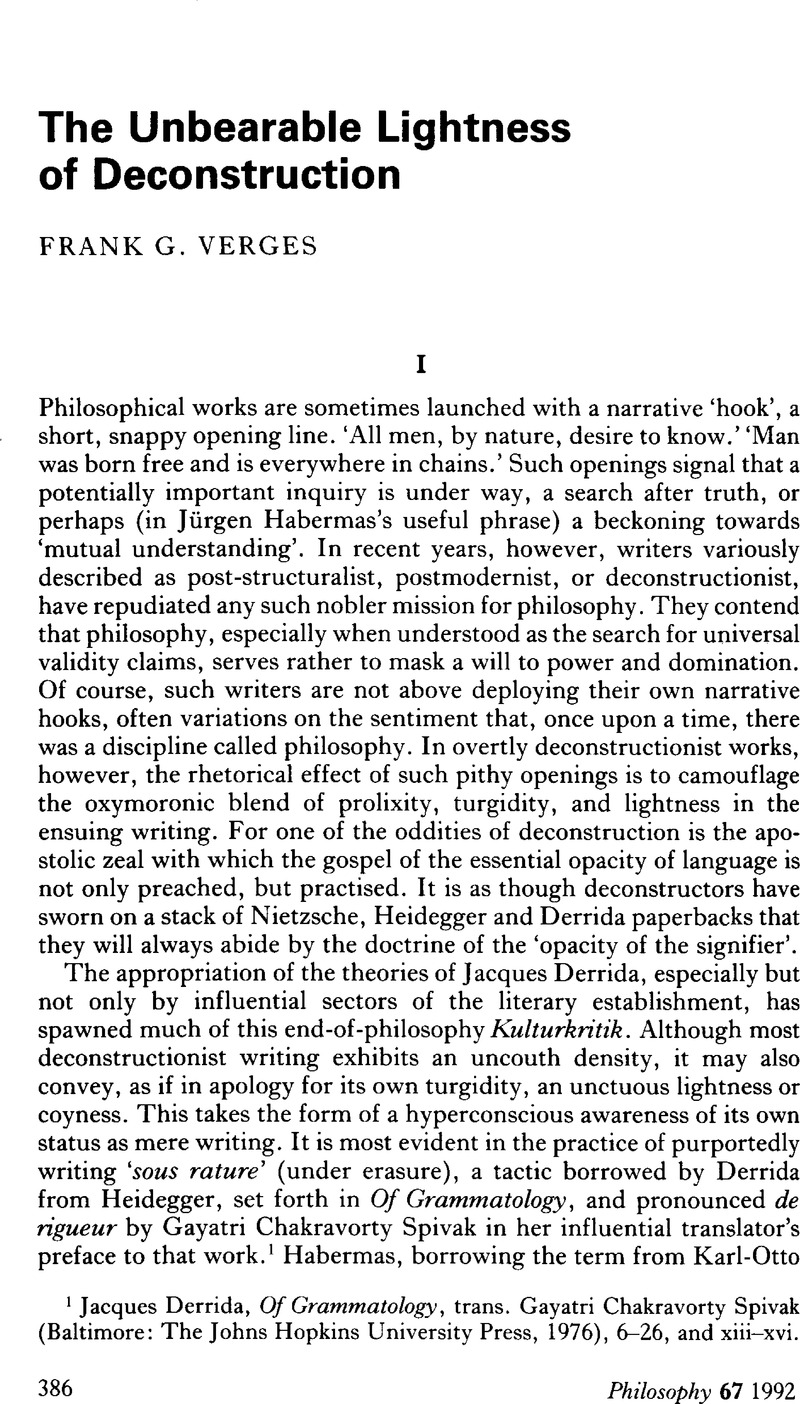Article contents
The Unbearable Lightness of Deconstruction
Published online by Cambridge University Press: 30 January 2009
Abstract

- Type
- Discussion
- Information
- Copyright
- Copyright © The Royal Institute of Philosophy 1992
References
1 Derrida, Jacques, Of Grammatology, trans. Spivak, Gayatri Chakravorty (Baltimore: The Johns Hopkins University Press, 1976), 6–26, and xiii–xvi.Google Scholar
2 Haberinas, J¨rgen, The Philosophical Discourse of Modernity (Cambridge, Mass: MIT Press, 1987), 185.Google Scholar
3 Derrida, , Of Grammatology, op. cit., 158.Google Scholar
4 Rorty, , ‘Nineteenth-Century Idealism and Twentieth-Century Textualism,’ ch. 8 of Consequences of Pragmatism (Minneapolis: UM Press, 1982), 154.Google Scholar
5 In ‘The Refutation of Idealism,’ Moore, wrote ‘When we try to introspect the sensation of blue, all we can see is the blue: the other element is as it were diaphanous.’Google Scholar Cf. Moore, G. E., Philosophical Studies (London: Routledge & Kegan Paul Ltd., 1922), 25.Google Scholar
6 Ricoeur, Paul, Hermeneutics and the Human Sciences, trans. Thompson, John, (Cambridge: Cambridge UP, 1981), 44.CrossRefGoogle Scholar
7 Cf. Habermas, Jürgen, The Theory of Communicative Action, vol. 1, (London and Boston, Mass., 1984), 366–399Google Scholar, and The Philosophical Discourse of Modernity, op. cit., eh. VII, 161–184.Google Scholar
8 Lyotard, Jean-Fran¸ois, The Postmodern Condition: A Report on Knowledge, trans. Bennington, Geoff and Massumi, Brian (Minneapolis: UM Press, 1984), p. xxiv.Google Scholar
9 The confusing but now established label ‘postmodern’ stands to deconstruction as genus to species. Rorty, unlike Nietzsche and Heidegger, celebrates modernity and aims only at a second-order critique of its philosophical foundations. Rorty has also ridiculed, in print, the jargon of deconstruction. Cf. Rorty, Richard, ‘Two Cheers for the Cultural Left,’ in The South Atlantic Quarterly, vol. 89, winter, 1990, p. 228Google Scholar. For differences between Rorty and Derrida, see the article cited in footnote 13 below.
10 McCarthy, Thomas, ‘Ironist Theory as a Vocation: A Response to Rorty's Reply,’ Critical Inquiry 16 (Spring, 1990), p. 644.CrossRefGoogle Scholar
11 Lévinas's remark is cited by Dews, Peterin Logics of Disintegration: Post- Structuralism and the Claims of Critical Theory, (London: Verso, 1987), 36.Google Scholar
12 Merquior, J. G., From Prague to Paris: A Critique of Structuralist and Post-Structuralist Thought (London: Verso, 1986), 189–260.Google Scholar
13 Rorty, Richard, ‘Deconstruction and Circumvention,’ Critical Inquiry, 11, 09, 1984, p. 17Google Scholar. Reprinted in Rorty, Richard, Essays on Heidegger and Others, Vol. 2 of Philosophical Papers (Cambridge University Press, 1991), 85–106.CrossRefGoogle Scholar
14 This statistic is cited by Said, Edward D. in ‘Opponents, Audiences, Constituencies, and Community,’ reprinted in The Anti-Aesthetic: Essays on Postmodern Culture, ed. Foster, Hal (Port Townsend, Washington: Bay Press, 1983), 138.Google Scholar
15 cf. Norris, Christopher, The Contest of Faculties: Philosophy and Theory after Deconstruction (London: Methuen, 1985)Google Scholar. Norris's unconvincing case for the hegemony of deconstruction is at least mitigated by the readability of his prose style, as graceful as it is rare amongst deconstructors.
- 2
- Cited by




